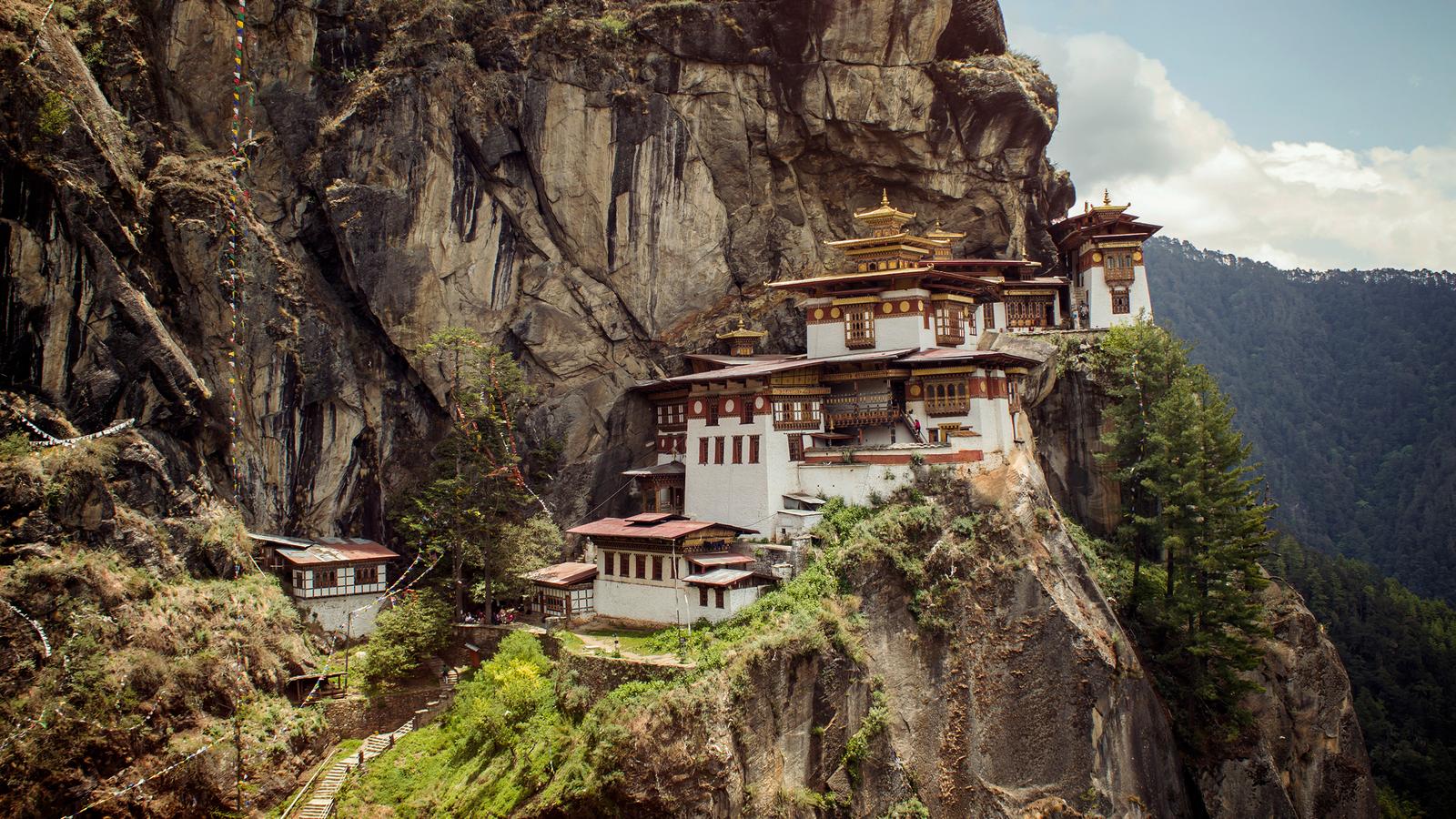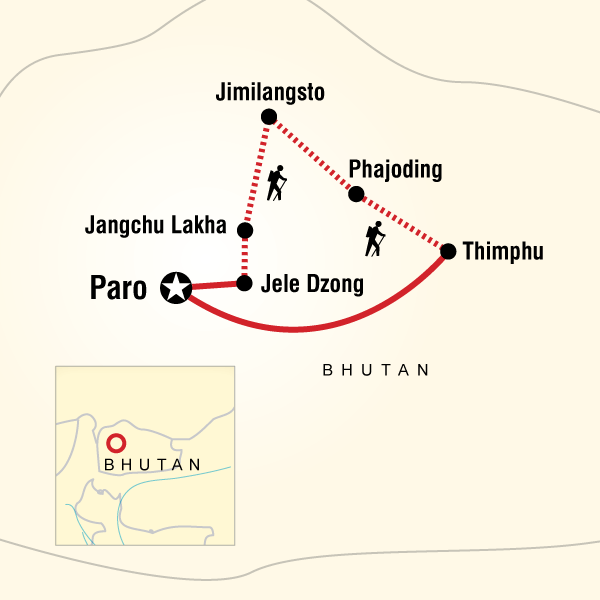Sorry! There are no remaining departures for "Bhutan Trekking - The Druk Path" (ADDP), but here are some similar trips.
Bhutan Trekking - The Druk Path
11 days, Paro to Paro
Itinerary
Day 1Paro
Arrive at any time, arrival transfer included. Take an orientation walk of Paro town before dinner at a local restaurant.
Arrive in Bhutan, clear customs, and meet your CEO. Catch the included transfer to the hotel.
Go for a short orientation walk of the town and enjoy a local dinner with the group.
Meals included:
DinnerDay 2Paro
Enjoy a day of sightseeing in the Paro valley and gain a deeper understanding of the country's history.
Sights include Drugyel Dzong, a ruined castle that has repelled many invasions, Kyichu Lhakhang, one of Bhutan's oldest monastaries and Ta-Dzong, an ancient watch tower.
Kyichu Lhakhang Temple Visit
Enjoy a visit to one of Bhutan's oldest and most beautiful temples. Built in the 7th century, Kyichu Lhakhang Temple boasts stunning art work inside and throughout the courtyards.
Drugyel Dzong
Explore Drugyel Dzong, a ruined monastery in the Paro Valley, with spectacular views of Mt. Jhomolhari.
Meals included:
Breakfast | Lunch | DinnerDay 3Paro
Hike to the stunning Taktsang Monastery (Tiger's Nest).
After breakfast, drive about 30 mins to the base of the famous Taktsang Monastery (Tiger's Nest). Make the walk up through the mountains to this incredible location.
Taktsang (Tiger’s Nest) & Monastery Hike
Hike up to the Taktsang monastery (Tiger’s Nest); containing 13 holy relics, it's considered one of the most venerated pilgrim sites of the Himalayan world. It is also where Guru Padmasambhava is said to have landed on the back of a tigress in the 8th century. Take in the stunning views en route and the incredible vista from this monastery, which clings to the rock towering 2,953m above the valley.
The group will hike from 2400m elevation and reach 3100m at the Taktsang Monastery before returning back to 2400m in the same day. The climb should take around 6 hours for a total distance of 7 km.
Meals included:
Breakfast | Lunch | DinnerDay 4Paro/Jele Dzong
Visit the Ta Dzong National Museum, before beginning the hike along the Druk Path to Jele Dzong.
Ta Dzong National Museum
The National Museum of Bhutan houses an extensive collection of Bhutanese art, with pieces dating back for centuries.
Druk Path Hike Day 1
Starting at Ta Dzong (2300m/7546 ft.), trek along a trail with a gradual climb towards camp. If the weather is clear the Paro valley can be seen with Mount Jhomolhari (7314m/23996 ft.) and other snow-capped mountains beyond the valley. Camp at Jele Dzong (3436m).
Meals included:
Breakfast | Lunch | DinnerDay 5Jele Dzong/Jangchulakha
Continue hiking from Jele Dzong to Jangchulakha. Admire the spectacular mountain scenery and flowering rhododendron bushes around the trail.
Druk Path Hike Day 2
Start out from Jele Dzong along a trail through thick alpine forest and rhododendron trees. The walking on this day is along the ridge, with a fair amount of ascents and descents. Mt. Jhomolhari will be visible on this day. Camp at Jangchulakha (3780m/12,402 ft).
Meals included:
Breakfast | Lunch | DinnerDay 6Jangchulakha/Jimilangtsho
Continue the hike through the mountains, heading for the lake at Jimelangtsho.
Druk Path Hike Day 3
Start out trekking from Jangchulakha. The trail follows the ridge and on clear day there are beautiful views of mountains and valleys. One highlight is the Jichu Drake (6989m/22930 ft). The lakes in this are are known for their giant sized trout. Camp at Jimelangtsho (3880m/12730 ft).
Meals included:
Breakfast | Lunch | DinnerDay 7Jimilangtsho/Simkotra
Trek along the Druk Path route to Simkotra Lake.
Druk Path Hike Day 4
The trail continues through dwarf rhododendron trees before passing by Janye Tsho Lake. On the route, you might see some Yak herder’s camp and see how some of the Bhutanese people live. Camp close to Simkotra Lake(4040m/13255 ft).
Meals included:
Breakfast | Lunch | DinnerDay 8Simkotra/Phajoding
Climb up to Phume La, where there is an opportunity for impressive views across the towering Himalaya peaks.
Druk Path Hike Day 5
Begin with a gradual climb up to Phume La (4210m/13812 ft), the highest elevation on this trek. Weather permitting you will have beautiful views of Mt Gankhar Puensum, the highest mountain in Bhutan and other Himalaya peaks. Below the entire Thimohu Valley is visible. Camp at Phojoding (3780m/12402 ft).
Meals included:
Breakfast | Lunch | DinnerDay 9Phajoding/Thimphu
Leaving Phajoding, trek down to Thimphu where the trek ends.
Druk Path Hike Day 6
Leaving Phajoding, trek down to Thimphu (2300m/7545 ft). The trek is mostly downhill through blue pine forest. By taking leisurely pace, it's possible to arrive in Thimphu in 3 hours for a nice hot shower and lunch.
Meals included:
Breakfast | Lunch | DinnerDay 10Thimphu/Paro
Spend the day exploring the sights of Thimpu, including the Institute of Traditional Medicine Services and Folk Heritage Museum.
Your Wellness Moment: Institute of Traditional Medicine Services
Visit the Institute of traditional Medicine, where old healing arts such as acupuncture and herbal remedies are still practiced.
Folk Heritage Museum
Explore the Folk Heritage Museum, which preserves the traditional art of weaving through exhibition and has a good collection of old textiles which are rich in colour and design.
Motithang Takin Preserve Visit
Enjoy a visit to the Motithang Takin Preserve, which was once a mini zoo. The area was converted into a preserve for Bhutan's national animal, the takin, which is a cross between a goat and an antelope.
Meals included:
Breakfast | Lunch | DinnerDay 11Paro
Depart at any time.

